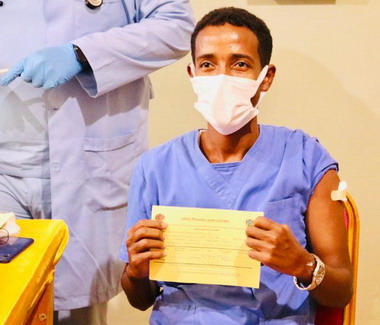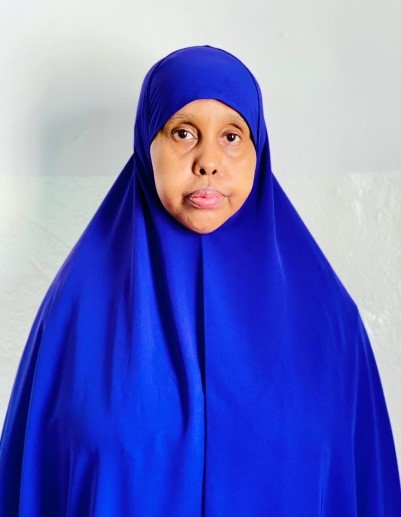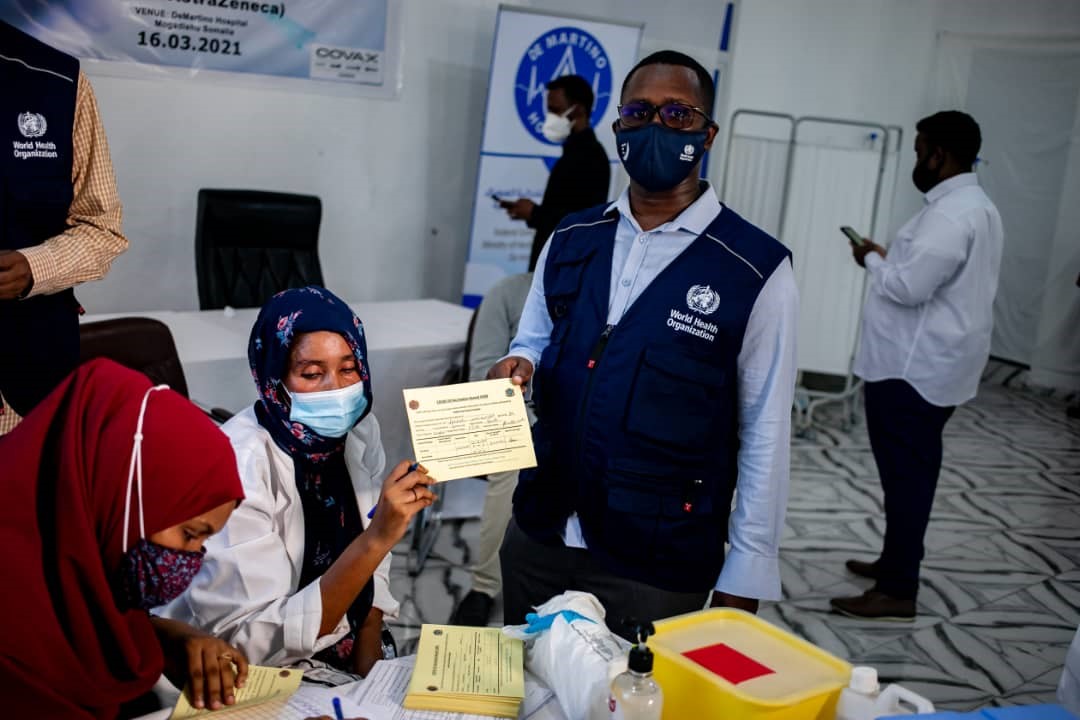On 15 March 2020, Somalia received 300 000 doses of Oxford AstraZeneca vaccines from the COVAX Facility to protect frontline workers and elderly people with chronic health conditions from COVID-19. The World Health Organization (WHO) hears back from some of the first people vaccinated in the capital city.
Spread the message – get vaccinated and keep safe
 As a medical doctor working along the front lines of public health service, Dr Aweis Olow Hassan received his vaccine against coronavirus disease (COVID-19) at Banadir Hospital on 16 March 2021. Dr Hassan serves as a medical doctor and stabilization centre supervisor at the hospital. On a regular day at work, Dr Hassan spends his time visiting patients and supervising staff at the nutrition unit, while concurrently training staff and medical students on the job.
As a medical doctor working along the front lines of public health service, Dr Aweis Olow Hassan received his vaccine against coronavirus disease (COVID-19) at Banadir Hospital on 16 March 2021. Dr Hassan serves as a medical doctor and stabilization centre supervisor at the hospital. On a regular day at work, Dr Hassan spends his time visiting patients and supervising staff at the nutrition unit, while concurrently training staff and medical students on the job.
As part of his hospital’s infection prevention and control committee, for the last year, Dr Hassan avoided being infected by COVID-19 thanks to his diligence in wearing a face mask and handwashing. It also helped that the team at the Banadir Hospital ensured they had handwashing stations at the entrance of the facility and in every ward.
At first, when Dr Hassan used to wear a face mask outside of the hospital, people would stare at him, shouting, “Corona! Corona! Corona!”
He adds people didn’t believe how serious COVID-19 could be, and thought it was just a common cold. But when some families started to lose their loves ones, they realized how big this was. With the ongoing wave though, Dr Hassan feels more and more Somalis are wearing face masks and taking precautions.
Dr Hassan, who is a researcher, actively follows news from the World Health Organization (WHO), United States Centers for Disease Control and Prevention (CDC) and European Medical Agency (EMA) online. Well before Somalia had access to COVID-19 vaccines, Dr Hassan often wondered how he could get vaccinated against COVID-19.
He is dismayed that the rumour mill continues to churn out misinformation though. He explains that he would like to assure people that the clinical trials for the COVID-19 vaccine were conducted extensively, and are now over. Now, there is confidence in the safety of vaccines being offered. Even the rumours about blood clotting have been cleared by studies.
“One thing is for certain,” says Dr Hassan, “COVID-19 can kill and vaccines do not. On the contrary, vaccines save lives. It’s as simple as that.”
For now, Dr Hassan requests all people who receives vaccines to share their experiences on social media and within their communities.
“A lot of my medical colleagues stood back and waited for me to get vaccinated first. Once they saw I had no side-effects, apart from a sore arm – which is a common side-effect – my colleagues rushed to get the vaccine,” says Dr Hassan, proud of being a positive influence on his peers.
“Everyone should take the vaccine for the sake of their own safety and that of the community,” adds Dr Hassan. “Sadly, we are losing our golden grandfathers, grandmothers and parents to COVID-19. Please let’s all wear masks, wash hands and take vaccines. I would like to share my messages that I spread and would like others to use them too:
Before vaccines – #Waan qaadanayaa talaalka (I will be vaccinated) and after vaccinations – #Waan qaatay talaalka ee fadlan adigana qaado (I took the vaccine and you should go get vaccinated).
Access improving slowly but health equity a big challenge
“I am so grateful to the Ministry of Health, WHO, the COVAX Facility and all other agencies who have brought COVID-19 vaccines to Somalia as we all know we don’t have money to buy these vaccines,” says Dr Luul Mohamud.
“This is such a great opportunity for all Somalis to take the vaccine. I just wish everyone could focus on the benefits of vaccinations instead of side-effects, as they are very rare indeed,” adds Dr Luul. “Besides even when children are vaccinated, sometimes they have very minimal side-effects. It is all a normal part of taking medicines.”

As the Dean of the Faculty of Medicine at the Jazeera University, a paediatric lecturer, and the former head of the paediatric department at the Banadir Hospital from 2007 to 2020, Dr Mohamud is a passionate advocate for vaccination.
She got vaccinated against COVID-19 at the Banadir Hospital on 20 March 2021, and after a while, returned to work with her face mask on again. Soon after this, she returned with her academic staff to help them get vaccinated too.
Dr Luul is also a member of the COVID-19 taskforce at the Somali Medical Association that worked with the Somali Government and partners on the preparation of protocols for COVID-19 case management, awareness raising, infection prevention and control, and training health care workers to address COVID-19.
Especially as she and her team members have been conducting online Zoom meetings to encourage people in the health fraternity and others to get vaccinated, Dr Luul is happy to see that vaccine acceptance is increasing.
“My message to all Somali people is to take vaccines – it is the only hope we have to defeat COVID-19 as our health system is very weak,” says Dr Luul. “We cannot treat all cases, especially critical cases, due to the lack of equipment and specialised personnel like anaesthetists. I do hope people take this seriously – COVID-19 is a deadly disease all around the world. Even developed countries have faced very high morbidity and mortality.
“On a related note,” she adds, “We need to increase overall vaccination around our country. As a health professional and with children of my own, I see Somali children dying every day due to vaccine-preventable diseases. We are looking at ways to increase our coverage and reach more children with routine vaccinations – and now we need to step up efforts and reach everyone possible with COVID-19 vaccinations.”
Our turn to give back and vaccinate our parents
Dr Abdulkadir Mohamed Abdi, a young Somali doctor who serves as a public health officer at WHO, was fourth in line to be vaccinated against COVID-19 in Somalia.
Inquisitive from the time he was young, when he learnt Somalia was going to receive the Oxford-AstraZeneca vaccines, Dr Abdulkadir decided to conduct some research to see why the country was receiving this particular vaccine over any other one. After reading extensively about vaccines available, and attending a WHO-led induction training on AstraZeneca vaccines, he learnt it was safe, effective and easy to store using the existing cold chain mechanisms and temperatures that Somalia offers.
Once his fears were allayed, he spoke to all his loved ones about vaccinations.
“I have convinced my parents to take the vaccine as I feel it is my turn to look after their health now,” Dr Abdulkadir says. “They had seen a lot of fake news about the vaccine from social media, but I asked them one question, “Did you get me vaccinated as a child?”
They chuckled and replied they had – and understood my message.
As part of his duties at work, Dr Abdulkadir engages with community members while supporting the Somali Government to trace, track and treat COVID-19 cases. He hears about people’s concerns about the COVID-19 vaccine and understands their doubts, but he urges Somalis to help each other understand the benefits of vaccination.
His message to Somali communities is to trust the COVID-19 vaccines. After all, every year, scientists have been working on technology to fight diseases. They are building on what they know to protect the world from new diseases.
People vaccinated so far in Somalia
As of 21 March, 1267 people had received COVID-19 vaccines in 4 of Banadir’s main hospitals – the Banadir Hospital, De Martino Hospital, Dr Sumait Hospital, and the Racip Tayip Hospital. Overall, 393 health workers, 129 municipal staff, 147 teachers, 111 members of the police force, 32 staff from points of entry and 455 elderly people received vaccines without any experiencing any major issues.
Meanwhile, vaccination teams in 17 of Banadir’s districts were trained in delivering and storing COVID-19 vaccinations. Additional health workers are also being trained in other states of the country.
From 21 March onwards, COVID-19 vaccinations started to roll out for frontline workers and elderly people with chronic conditions in Somaliland and Puntland.
Acknowledgements
WHO’s operational response to COVID-19 is supported by the following partners and donors:
- Gavi, the Vaccine Alliance
- Global Affairs Canada
- The Bill & Melinda Gates Foundation (BMGF)
- The COVAX Facility
- The European Union Delegation to Somalia (EU) and European
Commission’s Humanitarian Aid Office (ECHO) - The Foreign, Commonwealth and Development Office (FCDO)
- The Global Fund
- The Swiss Agency for Development and Cooperation (SDC)
- The United Nations Central Emergency Response Fund (CERF)
- The World Bank
- German Humanitarian Assistance
- The African Development Bank
- The Italian Agency for Development Cooperation (AICS)
